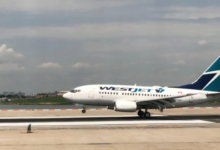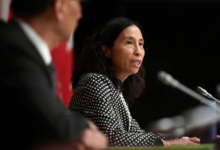Coronavirus: Here’s what’s happening in Canada and around the world Friday
Tight restrictions on non-essential travel between the United States and Canada are expected to begin later today as both countries try to slow the spread of the coronavirus, which has infected thousands around the world, disrupted economies and caused major airlines — including Air Canada and WestJet — to dramatically scale back service.
The government has urged all Canadians who are abroad to return home quickly, but some have struggled to find flights as they face border restrictions and limited travel options as airlines cut capacity.
A union official says Air Canada is laying off more than 5,000 flight attendants as it deals with a stark drop in the number of flights it operates, calling the move “difficult but necessary.” The airline had already said it plans to “gradually suspend the majority of its international and U.S. transborder flights” by March 31.
Wesley Lesosky, president of CUPE’s Air Canada component, said he has “never seen layoffs like this.”
WestJet has said it is suspending international travel as of Sunday for a 30-day period. Swoop, the discount carrier owned by WestJet Airlines, will do the same. The discount airline said it is now working to bring home more than 2,300 Swoop passengers who are still outside of Canada.
Sunwing Airlines says it expects to have all of its customers, most of whom are at Mexican or Caribbean resorts, back home by Monday. Sunwing is also offering vacant seats on its repatriation flights free of charge to any Canadians stranded in sun-kissed parts of the hemisphere, including non-Sunwing customers.
Worldwide, the death toll from COVID-19 passed 10,000 and infections exceeded 244,000, according to a Johns Hopkins University tally. Italy, with 60 million citizens, has recorded 3,405 deaths, exceeding the 3,248 in China, a country with a population over 20 times larger.
More than 86,000 people have recovered, mostly in China, but the pace is much slower than the spread of the virus. Recovery takes two weeks or so for mild cases but can be up to six weeks for those that turn serious, according to the World Health Organization.
Though the illness is mild in most people, the elderly are particularly susceptible to serious symptoms. Italy has the world’s second-oldest population, and the vast majority of its dead — 87 per cent — were over 70.
The illness causes mild and moderate symptoms in most people, but there are several segments of the population who are at higher risk of more severe illness, including seniors and people with underlying health issues. Dr. Theresa Tam, Canada’s chief public health officer, said Thursday that Indigenous people also face a higher risk because of health inequities, higher rates of underlying conditions and the difficulties that come with living in remote communities.
Read on for a look at what’s happening in Canada, the U.S. and other areas of the world dealing with the coronavirus pandemic.
Here’s what’s happening in the provinces and territories
British Columbia announced another COVID-19 related death linked to a long-term care home in North Vancouver. The province, which has reported eight deaths, has the most known cases in Canada, with more than 270. Dr. Bonnie Henry, the province’s top public health official, on Thursday reiterated a call for social distancing and other measures to slow the spread of the virus, telling people “the things that we’re doing right now are going to save us in the next two weeks.”
Ontario has reported its second COVID-19 related death. Health officials said Thursday that a man in his 50s with an underlying health condition who had no recent travel history outside Canada and no known contact with a COVID-19 case had died. The coroner will investigate to determine if COVID-19 was the main cause of death.
- In Toronto, the city is offering people extensions on things like water bills and property taxes.
- In Ottawa, the city’s top doctor took questions from the public on COVID-19 and how the nation’s capital is handling it.
- In the Kitchener-Waterloo area, hospitals are saying they have enough masks and sanitizers for now, but are working with suppliers and accepting donations to try and increase their stock.
Health Minister Christine Elliott — who has faced increased questions over test availability, wait times for testing and hospital capacity — said Thursday the province has added more telehealth lines and is working on improving lab testing. Read more about what’s happening in Ontario.
Alberta’s top doctor urged people to take the risks from COVID-19 seriously as the province reported its first death. Dr. Deena Hinshaw said Thursday that an Edmonton man in his 60s died late Wednesday. The province is doing “all we can to fight the spread of the virus,” Hinshaw said. “But to do this, we will need everyone’s help.”
Quebecers are being urged to limit travel, even within the province, to slow the spread of COVID-19. Premier François Legault is urging people to reduce their daily movement, saying “it’s not the time to go shopping or spend an hour in a restaurant.” As the province tries to clamp down on COVID-19, some hotels are preparing to step up in case they are needed to house non-infected patients to make space in hospitals.
In Saskatchewan, people are being urged to embrace social distancing measures as case numbers rise. The province, which as of Thursday night was reporting 20 confirmed and presumptive cases, has banned public gatherings of more than 50 people. But the chief medical officer of health wants people to avoid groups of more than five.
Health officials in Manitoba plan to open more isolation beds as the number of coronavirus cases rise. The province, like many others, is reviewing its inventory of critical supplies like protective gear for health-care workers and ventilators. More ventilators are on the way, officials said, and while the supply of protective gear is solid for now, the province has said it will buy more. Read more about what’s happening in Manitoba, which delivered a budget Thursday amid economic turmoil linked to the pandemic.
New Brunswick declared a state of emergency on Thursday, a move that requires a range of changes from businesses, including limits on how many people can congregate and measures ensuring social distancing. “I would say it’s very clear that it’s no longer a voluntary exercise,” Premier Blaine Higgs said.
Nova Scotia is allocating $1 million to help the province’s food banks amid growing economic damage caused by COVID-19. The province, which banned evictions of vulnerable people during the crisis, has said more supports will be rolled out in the days ahead.
The top doctor in P.E.I. is urging people to respect self-isolation and social distancing protocols, saying the province wants to avoid the stark situations seen in places like Italy.
A top education official in Newfoundland and Labrador says all students between kindergarten and grade nine will pass to the next grade, “no matter what time we get back.” Tony Stack, CEO of the Newfoundland and Labrador English School District, said the plan for high school students is not yet finalized.
There are no reported cases of COVID-19 in Canada’s North, but efforts are underway to ensure governments are prepared. Yukon is setting up a respiratory assessment centre, and education officials in the Northwest Territories are looking into measures to support students.
As of 6:30 a.m. ET on Friday, there were 873 presumptive and confirmed cases in Canada, with 12 deaths and 11 listed as recovered.
- British Columbia: 271 confirmed cases, including five recovered and eight deaths.
- Ontario: 258 confirmed cases, including five recovered and two deaths.
- Alberta: 146 confirmed cases, including one death.
- Quebec: 121 confirmed cases, including one recovered and one death.
- Saskatchewan: 20 confirmed and presumptive cases.
- Manitoba: 17 confirmed and presumptive cases.
- New Brunswick: 11 confirmed and presumptive cases.
- Nova Scotia: 14 confirmed and presumptive cases.
- Prince Edward Island: Two cases the province lists as positive.
- Newfoundland and Labrador: Three confirmed and presumptive cases.
- Repatriated Canadians: 10 confirmed cases.
Presumptive cases are individuals who have tested positive, but still await confirmation with the National Microbiology Lab in Winnipeg. Not all provinces are listing figures on those who have recovered.
Here’s what’s happening in the U.S.
From Reuters, updated at 6 a.m. ET
U.S. senators from both parties were expected to meet on Friday along with Trump administration officials to try to devise a rescue plan for an economy reeling from the coronavirus, after Republicans made a $1 trillion US opening bid.
The massive Republican package unveiled on Thursday includes cheques of up to $1,200 for many Americans, and hundreds of billions of dollars in loans for small businesses and industries. It also would allow Americans a breather on filing their income taxes until July. They are normally due in April.
Senate Majority Leader Mitch McConnell introduced the package after talks with the White House and his fellow Republicans. He then invited Democrats to join them in negotiations on Friday, along with Treasury Secretary Steven Mnuchin and White House economic adviser Larry Kudlow.
McConnell vowed the Senate would not adjourn until it had taken action and sent a measure to the Democratic-led House of Representatives, but any vote was probably days away.
Democrats said they were ready to talk, but were also wary, noting they had not been involved in drafting the plan.
“To earn Democratic support in the Congress, any economic stimulus proposal must include new, strong and strict provisions that prioritize and protect workers, such as banning the recipient companies from buying back stock, rewarding executives and laying off workers,” Senate Democratic leader Chuck Schumer said in a joint statement with his fellow Democrat, House Speaker Nancy Pelosi.
The package is the third taken up by Congress since the coronavirus erupted in the United States. The highly contagious respiratory disease had infected 12,259 people in the country and killed 200 as of Thursday night. It has shut schools, businesses and wide swaths of American life, and sent the stock market into a tailspin.
Congress passed an $8.3 billion US measure earlier this month to combat the coronavirus outbreak and develop vaccines. On Wednesday, lawmakers approved and Trump signed a $105 billion-plus plan to limit the damage through free testing, paid sick leave and expanded safety-net spending.
A key plank in the latest measure is direct payments of up to $1,200 for individuals earning up to $75,000 annually, a Senate Finance Committee statement said. Students would be allowed to defer payments on student loans.
The bill also includes $300 billion for small businesses, and $208 billion in loans for distressed industries, including $50 billion for passenger airlines and $8 billion for cargo air carriers.
Here’s what’s happening in Europe
From The Associated Press and Reuters, updated at 8:30 a.m. ET
Mayors of many towns in Italy are asking for more stringent controls on citizens’ movements to help contain surging coronavirus infections. Despite a national lockdown that strictly limits conditions under which people are allowed to leave their homes, there have been many violations. Authorities say as of Friday morning, more than 53,000 summons have been issued for violations.
State radio said Friday that Premier Giuseppe Conte might announce tighter measures nationwide. On Thursday, Italy’s deaths from the virus — 3,405 — surpassed those in China, where the outbreak began.
In France, President Emmanuel Macron urged worried employees to keep working in supermarkets, production sites and other key businesses amid tight restrictions on movement imposed to fight the rapid spread of the coronavirus in the country.
“We need to keep the country running,” Macron said.Businesses allowed to remain open are required to apply strict rules about social distancing, washing hands and disinfection. French health authorities have reported almost 11,000 cases of people infected with the virus, including 372 who have died.
Britain is asking 65,000 retired nurses and doctors to return to work to help fight the coronavirus. The government is sending letters to 50,000 former nurses and 15,000 retired doctors, and Health Secretary Matt Hancock said he hoped “many, many thousands will respond” to the appeal. He said volunteers would be given training over the next few weeks before being allocated to hospitals. The U.K. has 3,269 confirmed cases of COVID-19, and 144 people have died.
The German state of Bavaria will impose general restrictions on going outside for two weeks in a bid to slow the spread of the coronavirus, state premier Markus Soeder said on Friday. “It’s not easy to take these decisions,” Soeder said. “We take these decisions according to the best of our knowledge and conscience. There will be a Bavaria after corona, but it will be a stronger one if we don’t look away.”
Here’s what’s happening in Asia
From Reuters and The Associated Press, updated at 7 a.m. ET
Malaysia will mobilize its army, starting Sunday, to help enforce curbs on movement aimed at reining in the coronavirus, the government said on Friday. Since Wednesday, Malaysia has closed its borders, schools and non-essential businesses for two weeks and ordered people to limit going outside as it grapples with 1,030 cases, the highest number of infections in Southeast Asia.
In Thailand, an outbreak of the virus has been traced to a boxing event that took place at the beginning of March. There are now 72 cases of COVID-19 from three boxing stadiums since the first cluster of transmission was reported from one match at Lumpinee Boxing Stadium in Bangkok held on March 6. Since those clusters were reported, the number of confirmed cases in Thailand has jumped to 322, doubling the number within a week.
In Indonesia, Jakarta, the Istiqlal grand mosque, the largest mosque in Southeast Asia, has cancelled mass prayers for the next two weeks to avoid spreading the virus. Indonesia has had 25 deaths from COVID-19, the most in Southeast Asia, and has 309 cases.
The foreign ministers of South Korea, China and Japan held a video conference on Friday to discuss co-operation on the coronavirus pandemic amid growing concern over the number of infected people arriving in their countries from overseas.
Though the epidemic erupted in China in December, and South Korea at one stage had the second-most infections, both subsequently succeeded in stifling domestic transmission of the virus.
The Korea Centers for Disease Control and Prevention (KCDC) reported 87 new coronavirus cases on Friday, bringing the total national infections to 8,652. As of Thursday, there were 79 cases involving infected people who had recently arrived in the country, up from 44 on Sunday. Most of them were South Koreans, 27 came from Europe, 16 from China, and 12 from other Asian countries, according to the KCDC.
Wuhan, China, where the outbreak began, offered a ray of hope with no new infections reported for a second day in a row and only 39 cases reported nationwide — all of them brought from outside the country, the government said.
The number of cases in Japan has been far smaller than in China and South Korea, but Tokyo has the extra worry of whether to press ahead with hosting the Olympics this summer.
Japan was given expressions of support for hosting the Olympics during the video-conference call between the ministers, according to South Korea’s foreign ministry. The government remains committed to holding the Games as planned in July, despite expectations that some 600,000 spectators and athletes would descend on Tokyo.
Japan has had 963 domestically transmitted cases and 33 deaths, according to public broadcaster NHK. That does not include more than 700 cases and seven deaths from a cruise ship moored near Tokyo last month.
Here’s a look at some other developments around COVID-19
- Iran has announced 149 more fatalities from the novel coronavirus, bringing its death toll to 1,433 amid nearly 20,000 confirmed cases. Iran is battling the worst outbreak in the Middle East, and has been widely criticized for its slow response. The country’s leaders struck an upbeat tone earlier Friday, issuing messages in honour of the Persian new year in which they vowed to overcome the pandemic.
- South Africa announced coronavirus cases jumped to 202, the most in the sub-Saharan region, and the country’s largest airport announced that foreigners would not be allowed to disembark. Another African nation announced its first case, Cape Verde. Thirty-seven countries on the continent now have cases, with a total now well above 800.
- Brazil is the hardest-hit country in Latin America, with 621 confirmed cases. Several countries in Latin America are among the least prepared in the world for a pandemic, with health-care systems already stretched thin. Peruvian Minister of Defence Walter Martos previously told local America TV that the nation has less than 400 respirators available. “It’s not a lot,” he said. “Really, we don’t have the infrastructure that developed nations do.”
- Australia has ratcheted up its social distancing regulations to slow the spread of the novel coronavirus, demanding indoor venues provide at least four square metres of space per person. The space constraint announced Friday follows a ban on Wednesday of non-essential indoor gatherings of more than 100 people, including weddings and restaurants. Gatherings considered essential include schools, supermarkets and workplaces, which are exempt. Australia has also tightened regulations on travel to and from remote Indigenous communities in a bid to spare them COVID-19 outbreaks.
CBC








Redes Sociais - Comentários